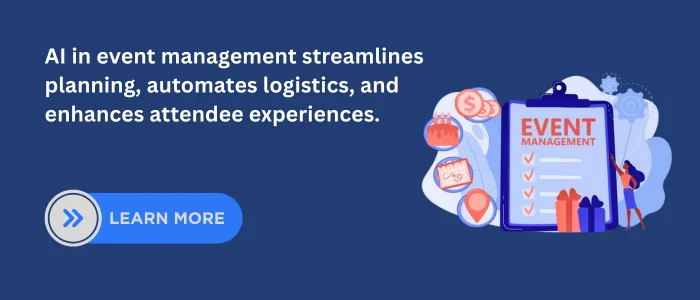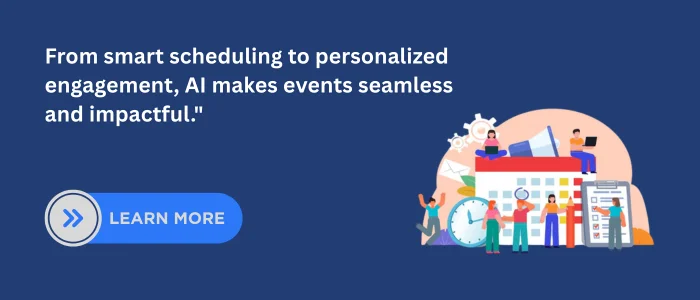Introduction
AI in Event Management is transforming the industry by automating tasks, optimizing schedules, and enhancing attendee experiences. From chatbots and predictive scheduling to personalized marketing and live dashboards, AI-powered tools reduce manual work and improve efficiency.
As events grow larger and more complex, these intelligent solutions ensure smoother operations, real-time insights, and greater engagement. Embracing AI for event management today helps businesses stay competitive and future-ready. Learn more about our AI Development Services.
1. What is AI for Event Management?
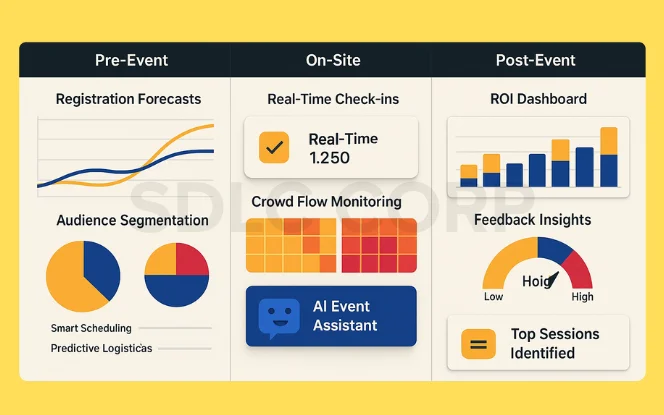
AI for Event Management refers to the application of artificial intelligence, intelligent automation, and machine learning to streamline the end-to-end process of event planning, execution, and evaluation. Instead of relying solely on manual coordination, AI-driven platforms analyze data, automate repetitive workflows, and provide predictive insights that enhance overall event performance.
The scope of AI event planning spans across three critical phases:
- Pre-Event Workflows: AI assists in venue selection, predictive scheduling, budget optimization, and personalized attendee outreach. Intelligent automation tools analyze historical data and forecast attendance trends, ensuring resources are allocated efficiently.
- On-Site Workflows: During live events, AI solutions enable real-time crowd management, smart check-ins, chatbot-powered assistance, and recommendation engines that guide attendees toward sessions or networking opportunities aligned with their interests.
- Post-Event Workflows: AI systems generate advanced analytics reports, sentiment analysis from feedback, and ROI measurement dashboards. Machine learning continuously refines future strategies by identifying patterns and bottlenecks from past events.
The integration of intelligent event automation transforms traditional processes into adaptive systems that evolve with audience behavior. For example, natural language processing (NLP) powers chatbots that handle attendee queries instantly, while machine learning models predict attendee preferences for targeted engagement. These innovations allow event managers to maintain precision, scalability, and personalization at every stage of the event lifecycle.
In essence, AI event management empowers organizations to design data-driven experiences that minimize manual effort while maximizing attendee satisfaction. As AI technologies advance, intelligent automation becomes a necessity, not just a competitive advantage, for modern event professionals.
2. Benefits of AI for Event Management Workflows
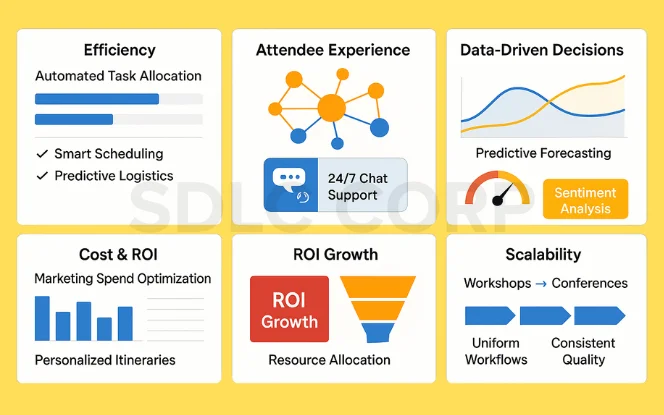
Artificial intelligence is redefining how event professionals approach planning, execution, and post-event analysis. The integration of AI for Event Management ensures consistent efficiency, improved engagement, and measurable returns across all workflows.
Streamlined Operations & Efficiency
Automation eliminates repetitive tasks by managing scheduling, venue selection, and resource allocation. AI platforms integrate with event management systems, ensuring:
- Real-time scheduling adjustments.
- Smart venue matching based on capacity, location, and budget.
- Automated vendor coordination and resource optimization.
This ensures precision while reducing manual errors and delays.
Enhanced Attendee Experience
AI event planning focuses on personalizing each attendee’s journey. Intelligent systems generate tailored itineraries, enhance matchmaking, and deliver chatbot-powered support.
Benefits include:
- AI-powered chatbots answering FAQs instantly.
- Personalized session recommendations through machine learning.
- Smart networking suggestions to connect like-minded participants.
These capabilities enhance engagement and deliver a seamless event experience.
Data-Driven Decision Making
Intelligent event automation leverages predictive analytics to empower decision-makers.
Real-time dashboards and forecasting tools allow planners to:
- Monitor live event performance.
- Predict attendance and engagement trends.
- Optimize session design using historical data patterns.
This continuous learning cycle enhances future event strategies.
Cost Optimization & ROI Growth
AI systems reduce costs while improving returns. Smarter algorithms allocate resources efficiently, while predictive insights minimize waste. For example:
- Targeted marketing campaigns maximize conversions.
- AI-powered budget tools prevent overspending.
- ROI dashboards provide visibility into event profitability.
For a deeper look, explore our detailed guide on Maximizing ROI with AI in Event Management.
Scalability & Consistency
AI enables organizers to manage multiple events simultaneously without compromising quality. Intelligent automation guarantees:
- Uniform workflows across various event scales.
- Consistent brand messaging and delivery.
- Rapid adjustments to accommodate audience demand.
This scalability empowers organizations to grow without operational bottlenecks.
Explore More : Generative AI for Event Management
3. Key Automation Workflows in Event Planning with AI
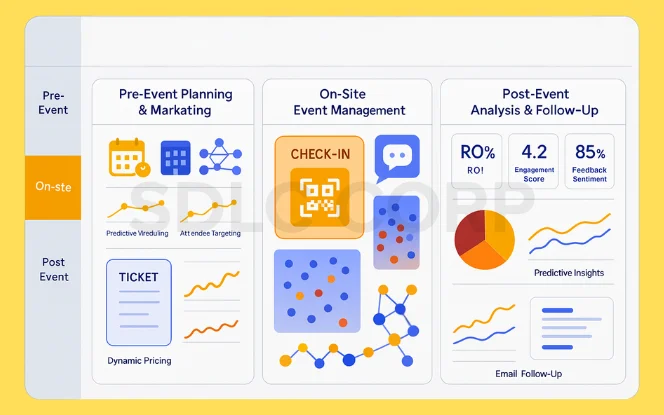
Automation powered by artificial intelligence transforms every stage of event planning, from initial promotion to post-event analysis. By embedding AI for Event Management into workflows, organizers achieve efficiency, precision, and personalization at scale. The following workflows illustrate how intelligent systems streamline pre-event, on-site, and post-event processes.
AI in Pre-Event Planning and Marketing
The pre-event stage sets the foundation for success, and AI event planning tools optimize every detail.
- Intelligent Venue Selection: Machine learning algorithms analyze factors such as budget, capacity, geographic location, and historical event performance to recommend the most suitable venue. These predictive insights prevent costly mismatches.
- Automated Agenda Planning: AI platforms map attendee preferences, topic trends, and speaker availability to create balanced agendas. This automation ensures time efficiency and session diversity.
- AI-Driven Marketing Campaigns: Predictive analytics identify target audiences and generate hyper-personalized campaigns. From automated email sequencing to dynamic social media ads, AI maximizes conversion rates.
- Smart Registration & Ticketing: Intelligent automation streamlines ticket sales by offering dynamic pricing, fraud detection, and real-time capacity updates.
- Personalized Attendee Engagement: Recommendation engines suggest relevant sessions, networking opportunities, and pre-event content to improve attendee preparation and satisfaction.
Workflow Advantage: These pre-event automations free planners from manual decision-making, enabling data-driven strategies that maximize turnout and engagement.
AI in On-Site Event Management
During the live event, intelligent event automation enhances attendee experience and operational control.
- AI-Powered Check-In & Crowd Control: Facial recognition and QR-based scanning accelerate entry, while AI monitors crowd flow to avoid congestion.
- Networking & Matchmaking Algorithms: Advanced algorithms match attendees based on professional interests, goals, and profiles. This increases networking efficiency and satisfaction.
- Chatbots as Virtual Assistants: Natural Language Processing (NLP)-driven chatbots answer FAQs, guide attendees, and provide instant updates. This reduces reliance on staff support.
- Live Translation & Accessibility Tools: AI-driven translation engines break language barriers, while accessibility tools support attendees with disabilities.
- Real-Time Analytics & Issue Resolution: AI dashboards track session attendance, technical glitches, and engagement metrics. Automated alerts ensure immediate resolution of on-site issues.
Workflow Advantage: On-site AI tools enhance operational agility while providing attendees with a seamless, personalized experience.
AI in Post-Event Analysis and Follow-Up
The value of an event extends beyond its conclusion. AI ensures post-event processes are just as impactful as planning and execution.
- Automated Feedback Processing: Machine learning analyzes survey responses, sentiment, and qualitative feedback to highlight key success factors and areas of improvement.
- AI-Generated Reports & Dashboards: Intelligent platforms generate detailed performance reports, including ROI calculations, engagement metrics, and session-level analytics.
- Personalized Post-Event Follow-Ups: AI tailors follow-up emails, recommendations, and offers to attendees based on participation data. This improves retention and future event interest.
- Predictive Planning for Future Events: Historical data is fed into machine learning models to forecast attendance, budget needs, and engagement trends. These insights ensure continuous improvement.
Workflow Advantage: AI ensures long-term value by transforming post-event data into actionable insights, directly influencing ROI and strategic growth.
4. AI Tools and Platforms for Event Management Automation
The adoption of AI for Event Management is rapidly increasing as organizers seek advanced platforms to optimize workflows. These tools combine automation, machine learning, and predictive analytics to support everything from marketing to attendee engagement. Selecting the right platform depends on integration flexibility, usability, and scalability.
Check Out : Effortless Event Management with Odoo’s Powerful Event Module
Criteria for Selecting AI-Powered Event Tools
When evaluating AI event planning platforms, professionals should prioritize:
- Integration: The tool must seamlessly connect with CRM, marketing automation, and virtual event platforms.
- Usability: A user-friendly interface ensures faster adoption by teams and reduces training costs.
- Scalability: Platforms should handle events of all sizes, from small conferences to large-scale expos.
- AI Feature Depth: Evaluate whether the AI capabilities extend beyond simple automation to include predictive insights, personalization, and intelligent engagement.
Comparison of Leading AI Event Tools
| AI Event Tool | AI Features | Best Use Case |
|---|---|---|
| Bizzabo | AI networking, automated agenda scheduling | Enterprise-level events |
| Cvent | Smart registration, matchmaking | Trade shows and large expos |
| Whova | Agenda suggestions, AI-driven engagement | Mid-sized conferences |
| Brella | AI matchmaking, session scheduling | Networking-focused events |
| Eventbrite Boost | AI-powered marketing, attendance analytics | Public ticketed events |
5. Best Practices for Implementing AI in Event Management
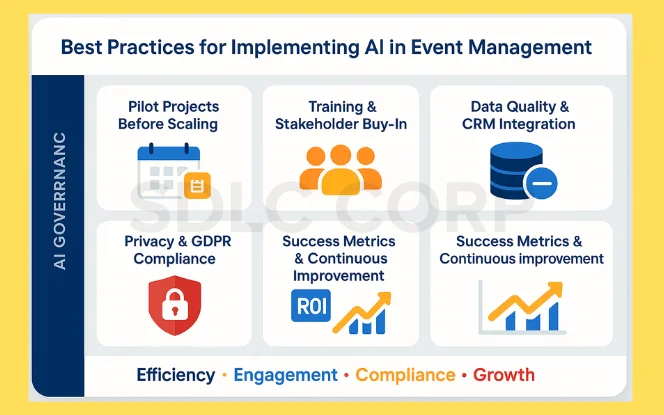
Integrating AI for Event Management requires more than adopting advanced tools it demands strategic planning, stakeholder alignment, and strong governance. Following best practices ensures successful deployment and long-term ROI.
Key Best Practices
- Pilot Projects Before Scaling: Begin with controlled pilot programs to validate AI workflows. Testing in smaller events identifies potential risks and provides measurable results before wider adoption.
- Training and Stakeholder Buy-In: AI event planning succeeds when staff and stakeholders are aligned. Provide training programs, hands-on demos, and change management initiatives to build confidence in intelligent event automation.
- Data Quality and CRM Integration: AI models rely on accurate data. Ensure attendee, vendor, and historical event data are cleaned, validated, and integrated with CRM platforms. This enhances personalization and predictive capabilities.
- Privacy and GDPR Compliance: Intelligent event automation must comply with privacy regulations. Establish strict governance protocols, anonymize attendee data when required, and ensure AI tools meet GDPR and regional data protection standards.
- Success Metrics & Continuous Improvement: Define KPIs such as attendee engagement, cost savings, and ROI. Use AI-generated reports to monitor these metrics continuously and refine future strategies.
Why Best Practices Matter
Implementing AI in event management without a structured framework can lead to fragmented workflows, compliance risks, and low adoption rates. By focusing on pilot projects, robust data integration, and compliance, organizations ensure that AI-driven automation enhances—not disrupts—operations. Transitioning from pilot to scaled adoption becomes seamless when teams trust the system, data is reliable, and results are measurable.
Read Also : Event Management: Planning Flawlessly with Odoo
6. Challenges of AI in Event Management
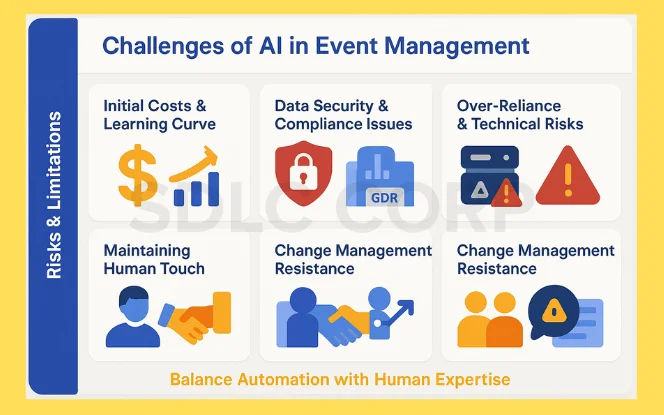
While AI for Event Management delivers significant value, organizations must address challenges that accompany adoption. Understanding these limitations helps planners design strategies that balance automation with human expertise.
Initial Costs and Learning Curve
Deploying AI event planning solutions often requires high upfront investment in software, integrations, and training. Smaller organizations may face resource constraints, while teams must adjust to new workflows. The learning curve can delay early results if not supported by proper onboarding.
Data Security and Compliance Issues
AI systems process large volumes of personal and behavioral data. This creates risks around data privacy, GDPR compliance, and cybersecurity. Without robust governance and secure integrations, event organizers expose themselves to regulatory penalties and reputational damage.
Over-Reliance and Technical Risks
Excessive dependence on intelligent event automation can increase vulnerability. Technical failures, algorithmic errors, or outages disrupt operations and create negative attendee experiences. Maintaining backup systems and manual protocols is essential for risk mitigation.
Maintaining the Human Touch in Events
AI excels at automation, but events remain inherently human experiences. Over-automation risks making interactions impersonal. Balancing AI-driven workflows with authentic human engagement ensures participants feel valued.
Change Management Resistance
Stakeholders often resist AI adoption due to fear of complexity, job displacement, or loss of control. Addressing resistance with clear communication, training, and pilot successes helps build trust and drive adoption.
7. Future Trends in AI for Event Management
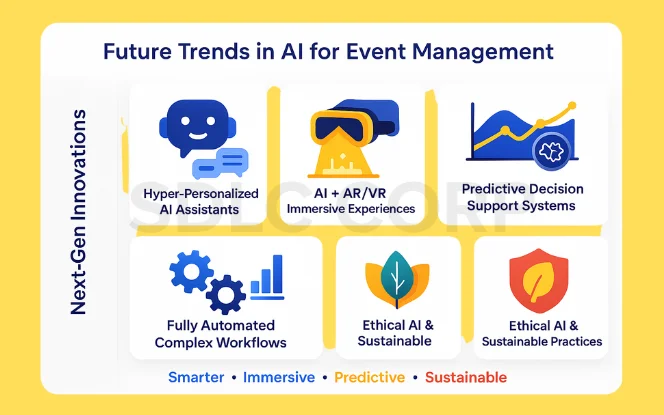
The next wave of AI for Event Management promises to go beyond automation and reshape how organizers design, deliver, and sustain experiences. By merging machine learning with immersive technologies, predictive insights, and ethical frameworks, the future of event management becomes smarter and more adaptive.
Hyper-Personalized AI Event Assistants
Advances in natural language processing and contextual AI enable hyper-personalized digital assistants. These tools deliver real-time updates, tailor agendas, and provide proactive reminders based on attendee behavior, ensuring an individualized event journey.
AI + AR/VR for Immersive Experiences
The fusion of AI with augmented reality (AR) and virtual reality (VR) will redefine engagement. Intelligent algorithms curate immersive environments, simulate networking scenarios, and design virtual venues that replicate in-person experiences for hybrid and global events.
Predictive Decision Support Systems
Machine learning evolves into predictive decision-making tools that guide organizers in real time. These systems forecast attendee turnout, recommend scheduling adjustments, and anticipate potential risks empowering planners to make informed, proactive decisions.
Fully Automated Complex Workflows
Future platforms will deliver end-to-end automation. From marketing campaigns and registration to live event adjustments and post-event analytics, AI will orchestrate every task. This reduces reliance on fragmented tools while ensuring seamless scalability across global operations.
Ethical AI and Sustainable Event Practices
As adoption increases, the role of ethical AI becomes critical. Transparency, bias reduction, and sustainability must guide system design. AI can also optimize energy usage, reduce waste through smart resource allocation, and promote eco-friendly event strategies.
Learn More : AI for Environmental Management
Conclusion
AI for Event Management is now a key driver of efficiency, engagement, and ROI across the event lifecycle. From automating pre-event planning and on-site operations to delivering predictive post-event insights, AI empowers organizers to create seamless and personalized experiences at scale.
By addressing challenges like compliance, costs, and change management, professionals can adopt AI gradually while unlocking long-term benefits. The future of AI in event planning lies in blending automation with human creativity ensuring events remain both efficient and memorable. Learn more about our AI Development Solutions for Event Management.
FAQs
1. What Is AI For Event Management?
It applies AI, machine learning, and automation to streamline event planning, execution, and analysis.
2. How Does AI Improve Attendee Experience?
By offering personalized agendas, smart networking, and chatbot support for seamless engagement.
3. Can AI Reduce Event Costs?
Yes. AI optimizes budgets, forecasts attendance, and improves ROI through smarter resource allocation.
4. What Are The Main Challenges?
High costs, data privacy issues, technical risks, and balancing automation with human interaction.
5. What future trends will shape events?
Hyper-personalized assistants, AI + AR/VR, predictive decision systems, and sustainable practices.


